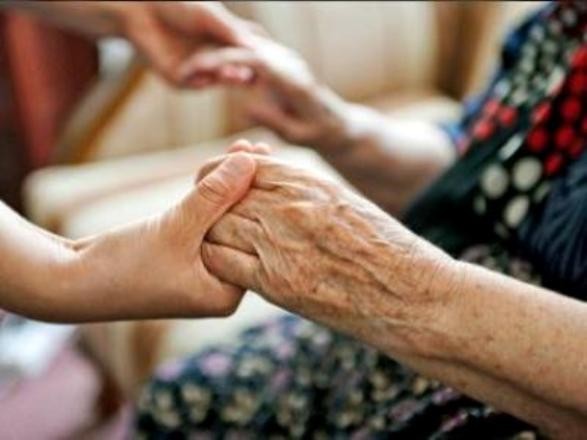Taking your parents to an elderly home until the end of their life cycle wasn’t an idea that went so well with the Albanian culture and mentality.
A bit because of the prejudice that elderly are forciblytaken therein the absence ofcare from the family, a bit because of the fear that these homes do not take proper care of them, Kosovo citizens were more prone to rather take care of their relatives on their own.
Elfete Shabani, a 73 year old, was sitting on one of the town park benches while taking care of her grandson. She enjoys the time watching him play and says that she can’t imagine her old age in any other way. She feels grateful that her children have returned the efforts she once made for them, and are now providing her a peaceful old age.
“My husband died two years ago and I live with my son and his family. I can’t imagine my old age differently. All our life, my husband and I have made efforts to make life better for our kids,so I believe that I deserve to live the last years of my life happily by their side.”
The Retirees Club has already turned into a routine for BehlulQerimi. He starts his day with a cup of tea, sitting at one of the tables of the café where he reads the newspaper and meets his friends.
“I come here every morning to pass time and meet my friends. I have two sons, both of them married abroad, while my wife died last year. I live alone and I come here every time I get bored.”
He said to have considered going to an elderly home, and doesn’t rule out the possibility of that happening soon.
However, according to the Ministry of Labor and Social Welfare, this may be impossible. Being accepted in the Home for Elderly People With No Family in Prishtina is regulated according to the Administrative Instruction no 07/2011, the sixth article, in particular, with one of basic criteria is that the respective person has no biological children, social workers claim.
In the Home for Elderly People With No Family in Prishtina some of the peers of Shabani and Qerimispeak, unlike them, they have not experienced the feeling of being a parent. Consequently, following the death of their spouse, not wanting to become a burden to their extended family, their only consolation was the home for the elderly.
Xhevrije Sylejmani, a 69 year-old from Podujeva says: “After the death of my husband, I lived at home for some years and took care of myself. When I realized that I couldn’t go on like this anymore, I decided to come here.”
She went through all the procedures for placement the home for the elderly by herself, and no one from her family members was aware of this until she moved there.
“I didn’t want to be a burden. Nowadays everyone has their own business and their own problems, and I didn’t want to be an annoyance.”
Hatë Uka, a 75 year-old, on the other hand, asked her nephews to take place her in this home.
“Two months after my husband died I came to live with my nephews in Prishtina. But I soon understood that there was no place for me there although they took good care of me. I didn’t want to become a burden so I asked them to take me to the home for the elderly.”
Sociologist Linda Gusia says that elders in Kosovo are not taken care of enough and even the Elderly Home in Kosovo has a negative connotation of abandoning them and doesn’t have the same idea of elderly homes in the west.
“Albanian culture is very traditional and in this sense even the care for a sensitive category like the elders has always been present. However, culture is not something absolute and it can change when it comes to different factors like: work dynamic, low economic standard, different misfortunes etc. But for us it is unacceptable not to offer sufficient opportunities and support. The elders without biological descendants are not the only ones that need taking care of. Other elders also may have different reasons why they need governmental support.”
She adds that there haven’t been any initiatives to improve this condition, which according to her has a lot of possibilities.
“The Scandinavian countries for example, have applied a very efficient program that pays students compensation with a symbolic stipendium to live with elders and this has had positive outcomes in both sides.”
Gusia says that this isn’t the only idea to support elders, it can be done in so many other ways, and there are so many reasons to make our society ask for extra aid for our elders, at least offer them the necessary conditions.
The Elderly Home in Prishtina was built during 1963/64. The current number of residents is 70, of which 37 are men and 33 women.
According to the report of the Ombudsperson Office in 2016, they approve the aspect of medicine supply, the level of hygiene in the kitchen and food, as well as the care and the treatment the elders receive from the staff, and central heating…in the Elderly Home. However, in the report emphasizes a number of aspects that need to be improved, like the old equipment, insufficient staff and difficult work conditions. All of these as well as the cooperation between the Elderly Home and the Ministry of Labor and Social Welfare were recommended in the report of the Ombudsperson Office.
Trëndelinë Haliti










